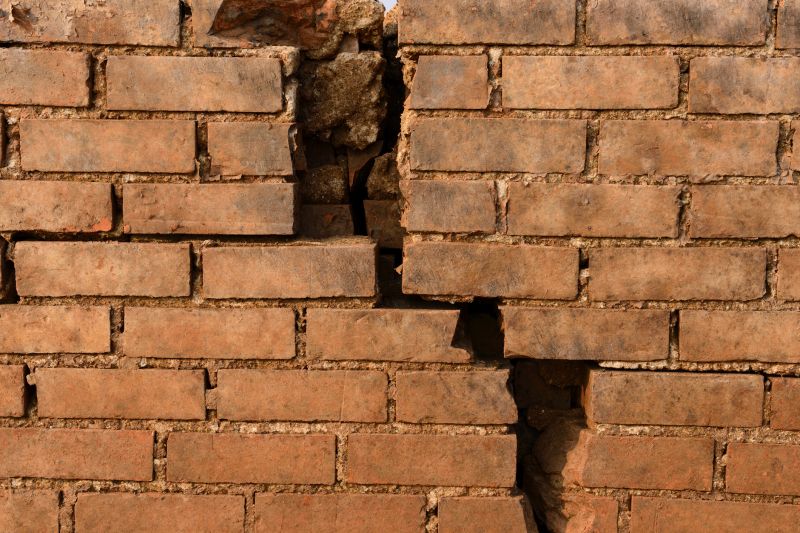Expert Picks For Cracked Brick Wall Repair Products You Can Trust
Choose from top-rated repair products trusted by professionals to effectively address cracks and prevent future damage.
 Cracked brick walls can be a common issue in both historic and modern structures, often resulting from settling, temperature fluctuations, or structural shifts. Addressing these cracks promptly is important to maintain the integrity and appearance of the wall. Repair products designed for cracked brick walls come in various forms, each suited to different types of damage and wall conditions. From flexible sealants to mortar patches, understanding the options available can help in selecting the most appropriate solution for a specific repair situation.
Cracked brick walls can be a common issue in both historic and modern structures, often resulting from settling, temperature fluctuations, or structural shifts. Addressing these cracks promptly is important to maintain the integrity and appearance of the wall. Repair products designed for cracked brick walls come in various forms, each suited to different types of damage and wall conditions. From flexible sealants to mortar patches, understanding the options available can help in selecting the most appropriate solution for a specific repair situation.
Top Overall Option
Flexible Brick Repair Sealant
A versatile sealant designed to accommodate movement and minor cracks in brick walls, providing a flexible, weather-resistant bond. Its ease of application and ability to blend with existing mortar make it a practical choice for various repair scenarios.
Types of Products For Cracked Brick Wall Repairs
Hydraulic Cement Patches
Quick-setting patches suitable for filling larger cracks and gaps, often used for structural repairs and to restore stability.
Epoxy Injection Kits
Specialized kits designed to inject into cracks to restore structural integrity and prevent further damage.
Flexible Sealants
Elastomeric sealants that allow for movement and are ideal for surface cracks that may expand or contract.
Mortar Repair Mixes
Pre-mixed or dry mixes formulated to match existing mortar, suitable for repointing and filling cracks.
Concrete Patch Compounds
Suitable for repairing cracks in brick veneer or concrete-based brick walls, providing a durable surface.
Waterproofing Sealants
Sealants designed to prevent water penetration through cracks, protecting against further deterioration.
Color-Matching Fillers
Patches and fillers that can be tinted to match the existing brickwork for a seamless repair.
Polyurethane Foam Fillers
Expanding foam products that fill voids and cracks, providing insulation and support.
Liquid Concrete Repair
Flowable products that can penetrate fine cracks and restore strength to damaged areas.
Repointing Mortar Sticks
Portable sticks that melt and can be pressed into cracks for quick repointing.
Popular Choices
Widely used for sealing surface cracks with high flexibility and weather resistance.
Commonly chosen for quick repairs of larger cracks and structural gaps.
Popular for structural crack repairs due to their strong bonding properties.
Frequently selected for repointing and filling cracks in mortar joints.
Chosen for preventing water ingress through cracks and protecting brickwork.
Popular for blending repairs seamlessly with existing brick surfaces.
Used for filling voids and cracks with expansion properties.
Chosen for penetrating fine cracks and restoring structural integrity.
Convenient for quick, on-the-spot mortar repairs.
When choosing repair products, it is essential to consider the severity and location of the crack, the material of the brick and mortar, and whether the repair needs to be weather-resistant or flexible. Proper surface preparation, including cleaning and dampening the crack area, can enhance adhesion and longevity of the repair. Many products are formulated to blend seamlessly with existing brickwork, ensuring that repairs are both durable and visually unobtrusive.
In addition to basic repair compounds, there are specialized products such as epoxy injections for structural cracks, cement-based patching compounds for larger gaps, and flexible sealants for ongoing movement. Some products also include color-matching options to help achieve a more uniform appearance. For best results, it is advisable to follow manufacturer instructions carefully and consider consulting a professional for significant or structural damage. Regular maintenance and timely repairs can extend the lifespan of brick walls and preserve their aesthetic appeal over time.
Key Buying Considerations
- Assess the severity and size of the crack to determine the appropriate repair product.
- Identify whether the crack is structural or superficial to select the correct repair method.
- Consider the compatibility of the repair product with existing brick and mortar materials.
- Determine if flexibility is needed to accommodate ongoing movement or expansion.
- Choose weather-resistant products if repairs are to be made outdoors exposed to the elements.
- Opt for color-matching options if aesthetic blending with existing brickwork is desired.
- Check the curing time and ease of application to fit your repair schedule and skill level.
- Evaluate whether the product provides water resistance to prevent future water ingress.
- Select products with good adhesion properties to ensure long-lasting repairs.
- Consider the size of the repair kit or product to match the extent of the damage.
- Review safety instructions and handling requirements for safe application.
- Look for products that are suitable for the specific type of brick or masonry involved.
- Factor in the environmental conditions, such as humidity and temperature, during application.
- Decide if structural reinforcement is necessary, which may require specialized products.
- Review product labels for compatibility with historic or delicate brickwork if applicable.
